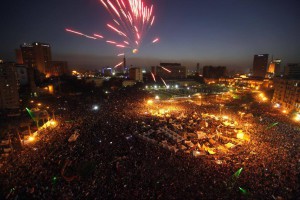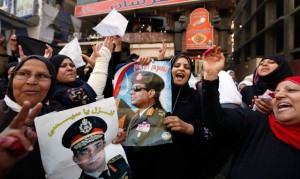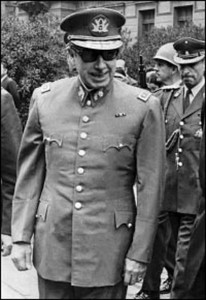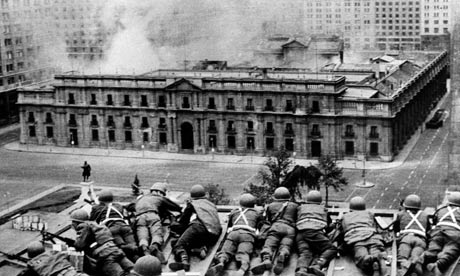On Sept. 11, 1973, the Chilean armed forces, led by Augusto Pinochet, overthrew the government of Salvador Allende in a violent coup. Remembered by Chileans as “the other 9/11,” 17 bombs were dropped in an attack on the presidential palace, Allende committed suicide, and 38,000 people were subjected to political imprisonment and torture. The coup cemented the power of the Chilean military, as Pinochet established a junta that would govern the country until 1990. Even though he won with a narrow margin, Allende was the first Marxist president to be democratically elected in Latin America. His attempt to restructure the economy, which led to food shortages and inflation, caused Allende to lose the support of the Congress, his constituents, and the people.

Fast forward to June 30, 2013 in Egypt – after only a year in power, millions of Egyptians took to the streets demanding the resignation of Islamist president, Mohamed Morsi. Also winning by a narrow margin of 51 percent, Morsi was the first president to be democratically elected after the January 2011 uprising that removed Mubarak. However, Morsi was able to aggravate the people in just one year by granting himself super-constitutional powers in November 2012, leaving his decisions unchecked by other branches of government. Having unfulfilled his promises on the economic front while governing like a “pharaoh,” Morsi alienated the people and the state’s inflated bureaucratic institutions. The chief of the Egyptian armed forces, Abdelfattah El Sisi, had given Morsi and political forces a chance to put an end to the crisis, but Morsi and his Muslim Brotherhood constituents remained defiant. On June 30th, after the streets erupted with protests, the armed forces gave Morsi a 48-hour deadline to contain the situation. By July 3rd, Morsi was put under house arrest, the armed forces had installed the head of the Supreme Constitutional Court, Adly Mansour as interim president, and the streets erupted in celebration.
Dubbed a “military coup” by the Brotherhood, a “revolution” by army supporters, and a “soft coup” by some academics, what occurred in Egypt throughout the past year provides insight into the power of the armed forces in the political sphere. In light of Sisi’s ever-growing popularity, the armed forces’ recent endorsement of his presidential candidacy, and the continuous crackdown against the Muslim Brotherhood, it is worth considering a comparison between the situation in Egypt and Chile in 1973. What do the countries have in common? What are the differences? What exactly constitutes a military coup and have they evolved?
Allende vs. Morsi
Both Allende and Morsi were elected with a polarizing vote, with Allende winning a narrow plurality and Morsi winning a slight majority. Both had their own loyal constituencies, with Allende relying on left-wing activists and Morsi relying on the Muslim Brotherhood’s Islamist base. However, these similarities only scratch the surface. Allende did not ignore the economy, but attempted to implement various socialist policies, which eventually caused the Christian Democrats, who controlled Congress, to turn against him. Morsi, on the other hand, made empty promises to fix the economy, while Egypt experienced gas, electricity, and water shortages and a plunge in its currency. Morsi also sought to monopolize power by placing himself above the law, attempting to overturn Constitutional Court rulings, and appointing members of the Muslim Brotherhood in high positions in government regardless of their merits. Morsi’s fatal mistake was alienating state and social institutions, such as the judiciary, the media, religious institutions (Al-Azhar and the Coptic Church), and security forces. Moreover, Morsi’s Islamist ideology and Allende’s socialism cannot be compared, as they have opposing views in terms of economy, religion, and worldview.
Pinochet vs. Sisi

After Morsi’s ouster, Sisi has enjoyed a great deal of popular support that has transcended the socio-economic divides in Egypt. With his posters popping up all over Cairo, Sisi has become a beacon of nationalism and is even being compared to Nasser, the charismatic pan-Arab colonel who took power in 1952. In contrast, there was no explicit popular call for Pinochet to govern Chile. He immediately appointed himself as President without competing in open elections, dissolved Congress, and ruled by decree. Sisi, on the other hand, continued to serve as Minister of Defense, while Adly Mansour installed a civilian interim government that consisted of technocrats. Sisi had the opportunity to immediately take power like Pinochet, but did not. Instead, he chose to wait until a constitution was written and passed by referendum before hinting his expected presidential bid. This does not demonstrate a “return of the military,” like many analysts suggest; but rather its further empowerment. Since Nasser’s coup in 1952, the military has functioned as a largely autonomous institution. Morsi’s 2012 constitution is a testament to this, as it ensured the armed forces’ special privileges. Thus, the Egyptian military dynamic greatly differs from that of Chile in 1973. Pinochet enabled the military to consolidate power and launched a full-fledged military dictatorship, while Sisi seems to be answering to popular will and placing himself as the military’s candidate in an upcoming election.
The Aftermath: Crackdown vs. Crackdown

It is also worth considering the context in which both scenarios played out. Pinochet’s coup occurred in the middle of the Cold War, with the Nixon administration fully supporting the Chilean army. The US did not want Marxism to flourish in Latin America, and thus had a firm policy that “Allende would be overthrown by a coup.” After taking power, Pinochet implemented free-market reforms inspired by the students at the University of Chicago, completely reversing Allende’s socialist policies. Moreover, Pinochet justified his brutal crackdown on leftists by referring to them as “Marxist terrorists,” while the US continued its support. What happened in Egypt, on the other hand, was purely based on domestic feelings of disenfranchisement with Morsi’s empty promises. While it may be argued that the US is turning a blind eye to the current police crackdown against Islamists, it is important to note that Morsi and the Brotherhood proved to be an asset for the US after negotiating a ceasefire deal between Hamas and Israel in November 2012, therefore, having Morsi continue his term would have worked for US interests. The June 2013 uprising was out of the US’ grasp, as the Obama administration underestimated the intensity of Egypt’s crisis.
The similarities between Pinochet’s Chile and Egypt lie in the human rights violations and crackdowns that followed each President’s ouster. However, Chile’s coup was more brutal as the army utilized its weaponry, detained thousands, and immediately killed people in the streets of Santiago. In Egypt, the main confrontation is between the police force and Muslim Brotherhood, with both sides perceiving it as a zero-sum game. This is demonstrated by the violent dispersal of pro-Morsi sit-ins and the various attacks that have targeted police institutions. Overall, it is too early to determine whether Egypt could turn into another Chile, but Sisi and his generals need to ensure they do not follow Pinochet’s footsteps.




